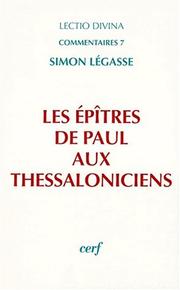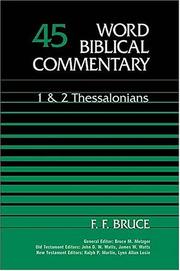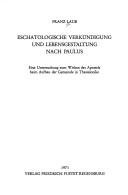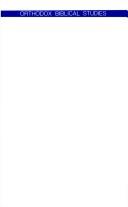| Listing 1 - 10 of 54 | << page >> |
Sort by
|
Book
Year: 1909 Publisher: Göttingen : Vandenhoeck und Ruprecht,
Abstract | Keywords | Export | Availability | Bookmark
 Loading...
Loading...Choose an application
- Reference Manager
- EndNote
- RefWorks (Direct export to RefWorks)
Book
ISSN: 07636377 ISBN: 290440712X 9782904407123 Year: 1991 Volume: 13 Publisher: Vaux-sur-Seine: Edifac,
Abstract | Keywords | Export | Availability | Bookmark
 Loading...
Loading...Choose an application
- Reference Manager
- EndNote
- RefWorks (Direct export to RefWorks)
Book
ISBN: 9788878392809 8878392804 Year: 2014 Volume: 206 Publisher: Roma: Pontificia Università Gregoriana,
Abstract | Keywords | Export | Availability | Bookmark
 Loading...
Loading...Choose an application
- Reference Manager
- EndNote
- RefWorks (Direct export to RefWorks)
Book
ISBN: 9780814682012 0814682014 9780814682265 081468226X Year: 2016 Publisher: Collegeville, Minnesota: Liturgical press,
Abstract | Keywords | Export | Availability | Bookmark
 Loading...
Loading...Choose an application
- Reference Manager
- EndNote
- RefWorks (Direct export to RefWorks)
When Paul wrote First Thessalonians shortly after the recipients had accepted the Gospel, many significant issues had already arisen among them. Of great concern was the social complexity, and even persecution, they encountered because they had "turned to God from idols" (1:9). The countercultural stance of those earliest believers, and especially the impact that may have had for women, is addressed throughout this commentary. While Paul directs no remarks only to women in this letter, the ramifications of his preaching on their daily lives emerge vibrantly from the application of a feminist hermeneutics of suspicion to the text. While Second Thessalonians is a shorter letter, it has been disproportionately influential on Christian thought, especially apocalyptic doctrine and the "Protestant work ethic." From a feminist perspective, it is androcentric, rhetorically manipulative, and even violent. In this commentary, Mary Ann Beavis and HyeRan Kim-Cragg explore this text from many angles to expose both constructive and destructive implications in the text. Notably, they suggest a perspective on the "afflictions" endured by the Thessalonian church that neither glorifies suffering nor wishes for revenge but rather sees the divine presence in women's acts of compassion and care in circumstances of extreme duress and inhumanity.

ISSN: 12429635 ISBN: 2204059919 9782204059916 Year: 1999 Volume: 7 Publisher: Paris: Les Éditions du Cerf,
Abstract | Keywords | Export | Availability | Bookmark
 Loading...
Loading...Choose an application
- Reference Manager
- EndNote
- RefWorks (Direct export to RefWorks)

ISBN: 0849902444 9780849902444 Year: 1982 Volume: 45 Publisher: Dallas: Word books,
Abstract | Keywords | Export | Availability | Bookmark
 Loading...
Loading...Choose an application
- Reference Manager
- EndNote
- RefWorks (Direct export to RefWorks)

ISBN: 3791703536 9783791703534 Year: 1973 Volume: 10 Publisher: Regensburg: Pustet,
Abstract | Keywords | Export | Availability | Bookmark
 Loading...
Loading...Choose an application
- Reference Manager
- EndNote
- RefWorks (Direct export to RefWorks)
Book
ISBN: 3525532571 9783525532577 Year: 1973 Volume: 110 Publisher: Göttingen: Vandenhoeck und Ruprecht,
Abstract | Keywords | Export | Availability | Bookmark
 Loading...
Loading...Choose an application
- Reference Manager
- EndNote
- RefWorks (Direct export to RefWorks)

ISBN: 0913836974 9780913836972 Year: 1982 Publisher: Crestwood: St Vladimir's seminary press,
Abstract | Keywords | Export | Availability | Bookmark
 Loading...
Loading...Choose an application
- Reference Manager
- EndNote
- RefWorks (Direct export to RefWorks)
Book
ISBN: 9783161610240 3161610245 9783161616341 Year: 2022 Publisher: Tübingen Mohr Siebeck
Abstract | Keywords | Export | Availability | Bookmark
 Loading...
Loading...Choose an application
- Reference Manager
- EndNote
- RefWorks (Direct export to RefWorks)
In this volume, Karol Piotr Kulpa offers a coherent analysis of the reception of 2 Thess. 2:3-12 by Tyconius in his Liber Regularum and his reconstructed Expositio Apocalypseos. The author proposes and applies his own method for a reception history composed of historical, literary, and theological levels, which is constructive as well as analytical. In this way he writes a history of reception that not only finds its anchor in the past, but also builds bridges to theological questions of the present. In particular, the author identifies that motifs of homo peccati, mysterium facinoris, and discessio drawn from 2 Thess. 2:3 and 2:7 become Tyconius' world-constructing verses in his understanding of Scripture, and of the bipartition in the church's reality, in human nature, and in eschatological temporality. As a result, he offers a refreshingly 'ecumenical' reading of Tyconius, refusing to reduce his significance to that of a 'heretical voice' but re-envisaging him as a potentially authoritative theologian and exegete.
| Listing 1 - 10 of 54 | << page >> |
Sort by
|

 Search
Search Feedback
Feedback About UniCat
About UniCat  Help
Help News
News